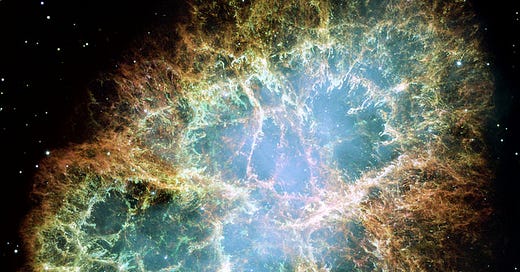Entropy & Eschatology
We shouldn’t extrapolate models of closed linear systems near equilibrium, e.g. statistical mechanics, to the whole of physical reality or its metaphysical possibilities & potentialities. Those models neither stipulate to nor postulate natural laws. They simply refer to assemblies of microscopic entities &/or microstates and describe their macroscopic behaviors & macrostates, probabilistically.
Those epistemic-ontic physical ensembles tell us very little about such fundamental questions such as regarding emergence (epistemological &/or ontological?), ontic domains (singular or plural? intra- & inter- ?), primitives (e.g. space, time, mass, energy & ¿consciousness?), axioms (e.g. nomicities, regularities & laws) & conditions (e g. initial, boundary & limit or mereological causation (top – down).
For example, even if we stipulated to space, time, mass & energy as primitives & consciousness as ontologically emergent, that wouldn’t exhaust the manifold & multiform ways those entities, properties, processes & regularities might comport & consort as principal kinds, interrelations, and modes of operation.
We’re nowhere near articulating a Theory of Everything.
As I’ve written, previously, our minimalist transcendent methodology would interrogate physical reality, for example, asking such questions as whether it’s necessarily
volumetrically in/finite,
geometrically un/bounded or un/closed,
topologically un/re/curved,
temporalized spatially or spatialized temporally,
essentially or emergently spatio-temporal,
a/symmetric,
essentially non/inflationary,
quasi/exponentially expansionary
dimensionally 2/3/4/more-D,
homo/hetero/genous,
an/isotropic,
uni/multi/versial,
with dimension/less physical constancy,
with non/universal constancy,
nomologically im/mutable
and on and on and on.
Answers to certain of these questions will necessarily implicate answers to certain others.
One way of contextualizing all of the above is by drawing a distinction between practical & absolute constraints and then speculating beyond the former. Fascinating ideas, then, would emerge, like Maxwell’s Demon, the Poincaré recurrence theorem or even quantum origins of true ontic emergence.
Robert John Russel’s eschatological understanding implies that the new creation is neither a replacement of the present creation, nor the mere working out of the natural processes of the world, but entails the radical transformation of the world by God’s new act.
~ Daniël P Veldsman
On emergence and eschatology: something has to give …
God utilises the energy that makes up the substance of the universe, the regularities according to which it functions and the undetermined potentials that make it flexible enough to allow intentionality and agency to manifest themselves. God does not bypass cosmic reality!
~ Klaus Nürnberger
Of course, the 2nd Law applies to closed systems left to themselves. We can’t a priori rule out that they are merely apparently closed, so open to novel, i.e. divine, energy sources, which could lower local entropy without borrowing energy from elsewhere in the “closed” system.




